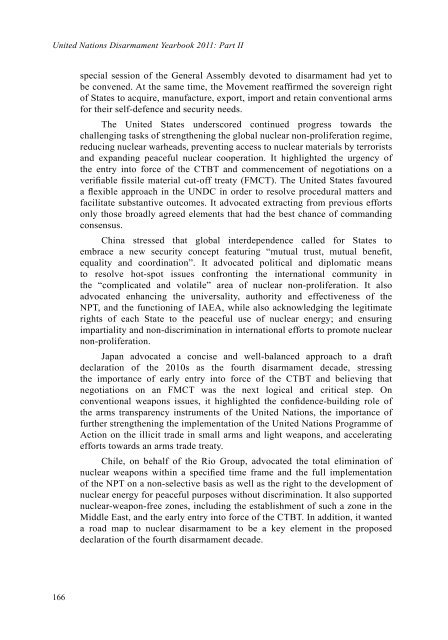DYB2011-Part-II-web
DYB2011-Part-II-web
DYB2011-Part-II-web
Create successful ePaper yourself
Turn your PDF publications into a flip-book with our unique Google optimized e-Paper software.
United Nations Disarmament Yearbook 2011: <strong>Part</strong> <strong>II</strong><br />
166<br />
special session of the General Assembly devoted to disarmament had yet to<br />
be convened. At the same time, the Movement reaffirmed the sovereign right<br />
of States to acquire, manufacture, export, import and retain conventional arms<br />
for their self-defence and security needs.<br />
The United States underscored continued progress towards the<br />
challenging tasks of strengthening the global nuclear non-proliferation regime,<br />
reducing nuclear warheads, preventing access to nuclear materials by terrorists<br />
and expanding peaceful nuclear cooperation. It highlighted the urgency of<br />
the entry into force of the CTBT and commencement of negotiations on a<br />
verifiable fissile material cut-off treaty (FMCT). The United States favoured<br />
a flexible approach in the UNDC in order to resolve procedural matters and<br />
facilitate substantive outcomes. It advocated extracting from previous efforts<br />
only those broadly agreed elements that had the best chance of commanding<br />
consensus.<br />
China stressed that global interdependence called for States to<br />
embrace a new security concept featuring “mutual trust, mutual benefit,<br />
equality and coordination”. It advocated political and diplomatic means<br />
to resolve hot-spot issues confronting the international community in<br />
the “complicated and volatile” area of nuclear non-proliferation. It also<br />
advocated enhancing the universality, authority and effectiveness of the<br />
NPT, and the functioning of IAEA, while also acknowledging the legitimate<br />
rights of each State to the peaceful use of nuclear energy; and ensuring<br />
impartiality and non-discrimination in international efforts to promote nuclear<br />
non-proliferation.<br />
Japan advocated a concise and well-balanced approach to a draft<br />
declaration of the 2010s as the fourth disarmament decade, stressing<br />
the importance of early entry into force of the CTBT and believing that<br />
negotiations on an FMCT was the next logical and critical step. On<br />
conventional weapons issues, it highlighted the confidence-building role of<br />
the arms transparency instruments of the United Nations, the importance of<br />
further strengthening the implementation of the United Nations Programme of<br />
Action on the illicit trade in small arms and light weapons, and accelerating<br />
efforts towards an arms trade treaty.<br />
Chile, on behalf of the Rio Group, advocated the total elimination of<br />
nuclear weapons within a specified time frame and the full implementation<br />
of the NPT on a non-selective basis as well as the right to the development of<br />
nuclear energy for peaceful purposes without discrimination. It also supported<br />
nuclear-weapon-free zones, including the establishment of such a zone in the<br />
Middle East, and the early entry into force of the CTBT. In addition, it wanted<br />
a road map to nuclear disarmament to be a key element in the proposed<br />
declaration of the fourth disarmament decade.


